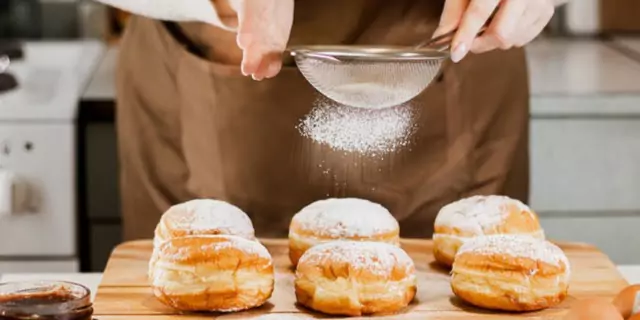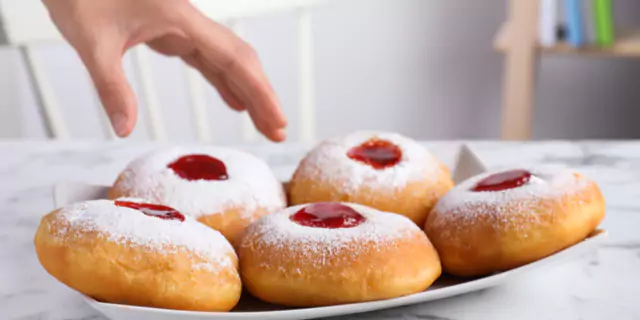
Happy Hanukkah! Also known as the Festival of Lights, this is an eight-day-long Jewish holiday that celebrates the rededication of the Second Temple in Jerusalem during the second century B.C. The word Hanukkah translates to “dedication” in Hebrew, and it begins on the 25th of Kislev on the Hebrew calendar.
More About Hanukkah Traditions

Before we begin to talk about things like your health and blood glucose, let’s take a minute to talk about some of the traditions. The star of the Hanukkah celebration is the lighting of the menorah, or hanukiah in Jewish, which is a nine-branched candle. This ninth candle is used to light another candle every night until all eight are lit (on the final night). Hanukkah is also a time for families to come together to play the dreidel (marked with four Hebrew letters “nes gadol haya sham” or “a great miracle happened there”), exchange gifts, and eat traditional foods.
One of the central themes behind Hanukkah is the Hanukkah miracle, celebrated by lighting the menorah. According to Jewish text, Judah witnessed a miracle at the second dedication of the Second Temple. The olive oil fueling the menorah in the temple burned for eight days, even though there was only enough oil for a single day! Now, as part of the celebration, traditional foods are fried in oil. The two most common are latkes [or potato pancakes usually served with sour cream and applesauce] and sufganiyot [or jelly-filled donuts—yum!].
Tips For a Blood Glucose Level Friendly Hanukkah

Whether you’re trying to lose weight, maintain a healthy weight or simply control blood glucose to optimize your health, the holidays can be a challenging time. And Hanukkah is no different! With all the delicious fried foods, you may have a hard time celebrating and staying healthy at the same time. This is because fried foods often contain refined carbohydrates and large quantities of saturated fat, resulting in an increase of fatty acids in your bloodstream. Eating too many fried foods may lead to glucose spikes and to those spikes lasting longer.
Worried you’ll have to skip all your favorite treats if you want to stay healthy? Before you start panicking about all the fatty acids we mentioned, remember to focus on having a stress-free holiday. If you’re a bundle of stress, no matter how much or how little you eat, your health could suffer in the long term. So, prioritize healthy habits, but don’t forget to prioritize a healthy mind. Relax, enjoy some time with family and friends and enjoy the holiday.
Remember that it may be easier to enjoy yourself if you have a game plan. What should you eat, when should you eat, are there healthier choices you can make? Take a little time to strategize and plan ways to make your health a priority so you’re not making decisions on the fly. Here are a few tips to help you out:
Say No to Sugary Drinks

Try to drink a lot of water or tea [without any accouterments—that means no sugar!] throughout the day to stay hydrated. Staying hydrated is always important but can also curb sugar cravings, make you feel fuller, and help you digest your food more efficiently. There is often alcohol involved in big celebrations, and while there’s no need to avoid it entirely unless you prefer to, it’s a good idea to exercise caution. If you have diabetes, remember that alcohol can interact with certain diabetes medications making them less effective. It can also cause spikes, or in some diabetes cases, dips, in your blood sugar. If you do indulge, try to avoid sugary mixers like juice and soda.
Avoid Letting Hunger Pangs Build Up

If breakfast and lunch are usually a part of your daily routine, don’t skip them just so you can eat more of the Hanukkah foods. As far as possible, stick to your daily routines even during the holidays. Not introducing changes on a special occasion will prevent cravings and hunger “surges” later in the day when all of the temptation-filled foods hit the table. If you usually eat breakfast, include some protein, like eggs and wholegrain toast or yogurt with nuts and fruit on top.
If you typically skip a meal during the day, follow that routine but make sure that you eat something when you're moderately hungry. Switching up your routine drastically and starving yourself before the celebratory meal can encourage overeating at the dinner table. A great tool to use is the Hunger Scale. By eating when you reach a three or a four on this scale, you’ll be able to think clearly at mealtime.
Be Mindful About Food
You don’t have to spend the day avoiding your favorite foods, but be mindful of the foods you do choose to eat. Getting to the main course on an empty stomach (unless you’re fasting) can make you overeat, or crave carbohydrate-rich foods. Eat some nuts, vegetables, or fruits if you’re starving before the big meal. Also, remember to be mindful of how full you are. Don’t reach for snacks just because they’re there, as that can encourage unhealthy eating practices too! If you're monitoring carbohydrate intake for your diet, here are average carbohydrate counts for a few Hanukkah favorites:

Get Moving
Physical activity is a great way to stay healthy through the holidays. And fitting in a bit of exercise before and after your meals can make a big difference in your body’s ability to efficiently process sugars. Postprandial exercise, in particular, can be an excellent way to improve glucose control, especially if you have type 2 diabetes. Go for a short walk with a loved one before and after your meals. This can be a delightful way to make memories and catch up with relatives too!
Try Baking Instead of Frying

If you’re open to modifying traditional recipes a little bit, this is a great option to try. One of the easier modifications is baking your sufganiyot and latkes. If you want to go a step further, swap out the potatoes in your latkes for zucchini or mixed vegetables. If you're baking your own challah, try opting for a whole grain version to add fiber and healthy grains.
Minor modifications can go a long way but still fit into traditions. Remember, everyone responds differently to different types of food, so don’t make any drastic changes without consulting a professional, like a registered dietitian.
Develop a Good Meal Strategy

Remember our tips from Thanksgiving? Try a similar approach here too! Begin your meal with some fiber. Fiber is filling and helps to slow down sugar absorption. It binds water and sugars into the waste in your digestive system, slowing digestion and allowing your body more time to process carbohydrates. And don’t forget about the protein. Not only will protein fill you up, but it will also help your body process those pesky sugars from all the fried, carb-heavy foods.
Then, once you feel a bit full, you can go ahead and indulge in some of the more decadent, carb-dense foods at the table. Another tip is to eat slowly and take breaks in between servings, especially before dessert. This will allow your body to register how full you really feel, and you can portion more appropriately.
Prioritize Fun and Share Quality Moments With Loved Ones this Hanukkah

Guilt and shame surrounding food can be just as unhealthy as stress. Everyone has a different body type and responds differently to food. So learning more about your body’s nutritional needs is more important than avoiding traditionally “unhealthy” foods. Still, it can be easy to become so food-focused that you forget why you’re around all the delicious food, to begin with. Allow yourself a guilt-free holiday so you can enjoy what you love the most (you can’t ignore all your mom’s excellent cooking, can you?).
Most importantly, have a Happy and Healthy Hanukkah this year!
Engage with Your Blood Glucose Levels with Nutrisense
Your blood sugar levels can significantly impact how your body feels and functions. That’s why stable blood glucose levels can be an important factor in supporting overall wellbeing.
With Nutrisense, you’ll be able to track your blood glucose levels over time using a CGM, so you can make lifestyle choices that support healthy living.
When you join the Nutrisense CGM program, our team of credentialed dietitians and nutritionists are available for additional support and guidance to help you reach your goals.
Ready to take the first step? Start with our quiz to see how Nutrisense can support your health.
Find the right Nutrisense programto help you discover and reach your health potential.

Kara Collier is the co-founder and VP of Health at Nutrisense, one of America’s fastest-growing wellness-tech startups, where she leads the health team. She is a Forbes 30 under 30 recipient, frequent podcast guest & conference speaker.




.jpeg)